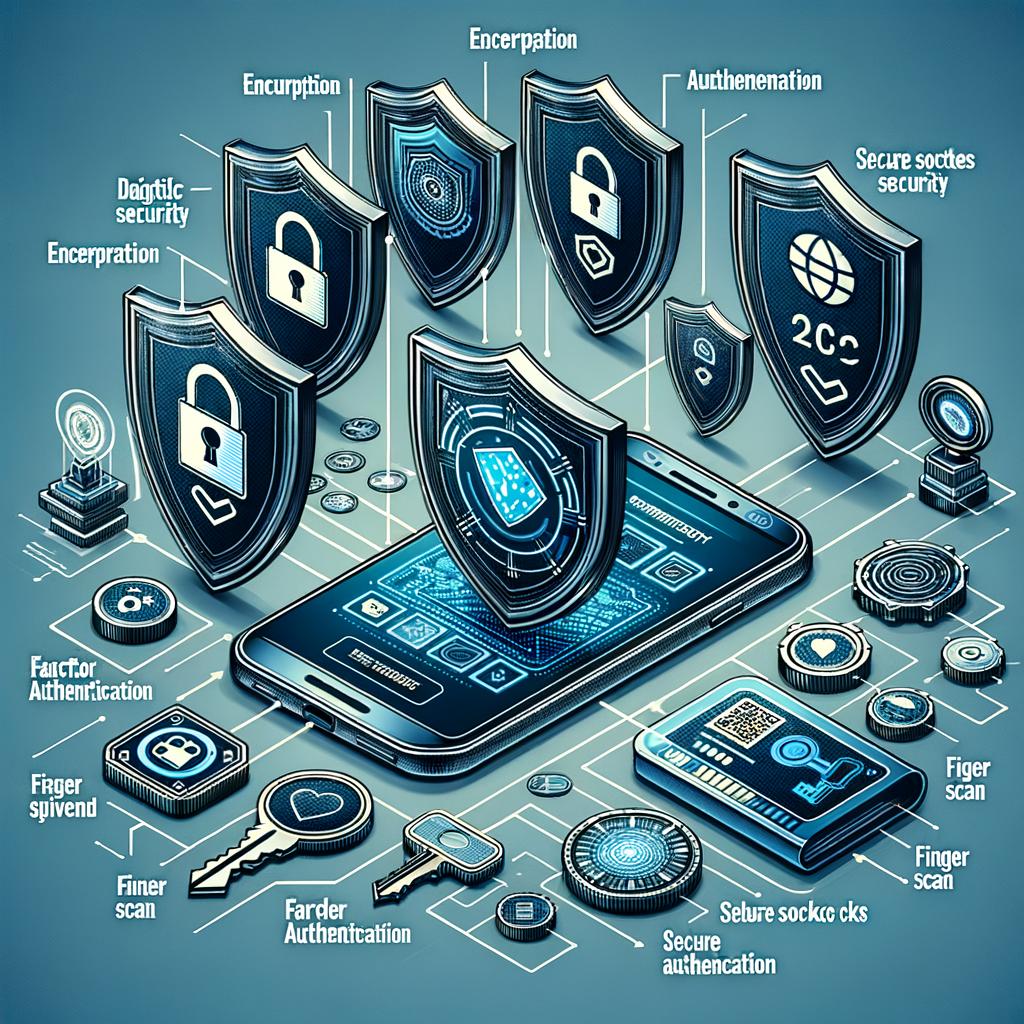Securing Mobile Payments: Challenges and Solutions
Are you tired of the never-ending maze that is technology? Do you ever feel like you’re navigating through a digital jungle filled with sneaky cyber criminals and pesky hackers? Well, fear not, for we have arrived to shed some light on the treacherous world of mobile payments! In this article, we boldly explore the challenges and unravel the mind-boggling solutions to securing your hard-earned money with just a swipe of your finger. So grab your favorite virtual safari hat, and let’s embark on this thrilling expedition together - in search of the ironclad armor that will shield your mobile payments from the clutches of those wicked digital villains!
Securing Mobile Payments: The Growing Concerns for Data Protection
In today’s digital era, mobile payments have revolutionized the way we shop and make transactions. Gone are the days of carrying bulky wallets or searching for loose change; now we can simply tap our devices to complete purchases. However, as convenient as this may be, the growing popularity of mobile payments has brought with it some serious concerns for data protection.
The Challenges:
- Increased Vulnerability: With more people using mobile payment apps, hackers have become more determined to exploit vulnerabilities in these systems. From phishing attacks to malware-infected apps, the threat landscape is constantly evolving.
- Lack of Standardization: As the market becomes flooded with various mobile payment platforms, compatibility issues arise. This lack of standardization makes it difficult for businesses to implement a unified security framework, leaving room for potential breaches.
- User Error: Despite the advanced security measures put in place by developers, users often fall prey to scams due to human error. From weak passwords to sharing sensitive information, individuals play a crucial role in compromising the security of their mobile payment data.
The Solutions:
- Implementing Multi-factor Authentication: By adding an extra layer of security, such as biometric authentication or one-time passwords (OTPs), mobile payment apps can significantly reduce the risk of unauthorized access.
- Encrypting Data: Securing sensitive payment data with encryption ensures that even if a malicious party gains access, the information will be unreadable and useless.
- Regular Updates and Maintenance: Mobile payment platforms must prioritize regular updates to patch vulnerabilities as they are discovered. Additionally, routine maintenance helps to ensure that any potential weaknesses are promptly addressed.
Identifying Key Vulnerabilities: Understanding the Risks and Challenges
In today’s digital age, mobile payments have become increasingly popular, providing convenience and efficiency for users in their everyday transactions. However, with the rise of this technology comes inherent risks and challenges that must be addressed to ensure the security of these transactions. Identifying key vulnerabilities is crucial to understanding the potential threats faced by mobile payment systems and finding effective solutions to mitigate these risks.
One major challenge in securing mobile payments is the threat of unauthorized access to sensitive user data. Hackers are constantly on the lookout for vulnerabilities in mobile payment apps, aiming to exploit them for personal gain. Implementing strong authentication measures such as biometric recognition or multi-factor authentication can help protect against unauthorized access. Additionally, utilizing data encryption techniques when transmitting user information can provide an extra layer of security against interception.
Another vulnerability that needs to be considered is the risk of device theft or loss. With mobile payments, users carry sensitive financial information on their smartphones, making them targets for theft. Implementing remote locking and wiping capabilities on mobile payment apps can help prevent unauthorized access to user accounts in case of a lost or stolen device. Furthermore, educating users about the importance of password protection and regularly updating their devices’ security software can go a long way in minimizing the risk of data breaches.
In conclusion, securing mobile payments is a complex task that requires a proactive approach towards identifying and addressing vulnerabilities. By understanding the risks and challenges faced by mobile payment systems, we can develop effective solutions to protect user information and ensure the integrity of these transactions. With strong authentication measures, data encryption, remote locking capabilities, and user education, we can enhance the security of mobile payments and provide users with a safe and convenient way to transact digitally.
Strengthening Security Measures: Effective Solutions for Mobile Payment Security
With the ever-increasing prevalence of mobile payments, securing the transactions has become a top priority for both businesses and consumers. As convenient as mobile payments may be, they come with their fair share of challenges and risks. However, by implementing effective security measures, these challenges can be addressed and overcome.
One of the major challenges in securing mobile payments is the risk of data breaches. Hackers are constantly evolving their techniques to gain unauthorized access to sensitive information, and mobile payment platforms are not exempt from their targets. To combat this, mobile payment providers need to invest in robust encryption protocols and data protection mechanisms. Additionally, user authentication measures such as biometric verification and two-factor authentication can add an extra layer of security. By ensuring that customer data is encrypted and user identities are verified, the risk of data breaches can be significantly reduced.
Another challenge in mobile payment security lies in the proliferation of fraudulent activities. Fraudsters employ various tactics like phishing, malware, and identity theft to exploit mobile payment systems. To counter these threats, businesses should educate their customers on the importance of being vigilant and cautious while conducting mobile transactions. Implementing real-time fraud detection systems can help identify any suspicious activities and prevent fraudulent transactions. Moreover, regularly updating and patching mobile payment apps can ensure that they are equipped with the latest security measures to combat emerging threats.
Keeping Your Mobile Payments Safe: Practical Recommendations for Users and Service Providers
Everyone loves the convenience of mobile payments, but keeping them safe can be a challenge. With the rise in mobile payment technology, it’s important for both users and service providers to take practical steps to protect themselves against fraud and security breaches. Here are some recommendations to help ensure the security of your mobile payments:
For Users:
- Use a secure mobile payment app: Stick with well-known apps from trusted providers that have a proven track record of security.
- Set up strong authentication: Protect your mobile payment accounts with a strong PIN, biometric authentication, or a unique password.
- Be vigilant with app permissions: Only grant necessary permissions to the mobile payment app and regularly review and revoke access from any unnecessary apps.
- Avoid public Wi-Fi networks: To reduce the risk of interception, avoid making mobile payments when connected to unsecured public Wi-Fi networks.
For Service Providers:
- Implement robust encryption: Ensure that all data transmitted between devices and your servers is encrypted to protect against eavesdropping and unauthorized access.
- Maintain strict access controls: Limit employee access to sensitive payment data and regularly review and update access privileges to prevent internal breaches.
- Monitor for suspicious activity: Implement real-time monitoring systems to detect any unusual patterns or behaviors that may indicate fraud or hacking attempts.
Concluding Remarks
And there you have it, folks! We’ve uncovered the wild world of securing mobile payments, bringing you face-to-face with the challenges and solutions that keep our hard-earned cash safe and sound. From hackers to fraudsters, it seems like there’s always a sneaky villain lurking in the shadows, ready to pounce on our digital transactions.
But fear not, for the geniuses of the tech world have come up with an arsenal of solutions to shield us from these cyber threats. It’s like a good ol’ game of cat and mouse, where the mice keep evolving, and the cats have to stay one step ahead to secure our funds.
One of the biggest challenges we faced was the ever-increasing sophistication of hackers. These sneaky devils have been honing their skills, sniffing out vulnerabilities and devising clever methods to get their hands on our personal and financial information. But mobile payment providers have been building fortress-like security measures to counter these wily hackers, creating a virtual maze that’s nearly impossible to navigate.
In response to this cat-and-mouse chase, biometric authentication has emerged as a knight in shining armor. With just a touch of your finger, a glance from your eye, or perhaps even the sound of your voice, your identity is securely verified. Biometrics not only adds an extra layer of security but also enables a user-friendly and effortless payment experience. Say goodbye to tedious passwords and hello to a world where you truly are the key to your digital kingdom!
But let’s not overlook the power of tokenization in the battle for secure mobile payments. With tokenization, sensitive payment data is replaced with a unique code or token, ensuring that your actual card information never falls into the wrong hands. It’s like replacing a stack of crisp dollar bills with a Monopoly money note – completely useless to those who try to snatch it!
But like any game, there are no guarantees of a quick and easy victory. As mobile payment technology continues to advance, so too do the challenges that lie ahead. Cybercriminals will always be forging new tactics, requiring our eternal vigilance to stay one step ahead. Thankfully, we’re backed by an army of brilliant minds working tirelessly to keep our transactions secure.
So, my friends, as we tap, swipe, and shop through the digital realm, let’s embrace the challenges and solutions that come our way. Together, we can navigate this thrilling world of mobile payments, armed with biometrics, tokenization, and the collective determination to keep our financial souls airtight. Remember, securing the digital playground may be a cat-and-mouse game, but we’re the ones holding the controls. Stay savvy, stay secure, and happy shopping!






